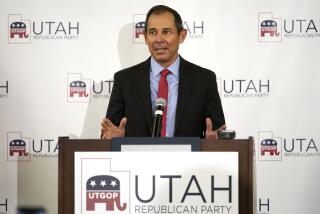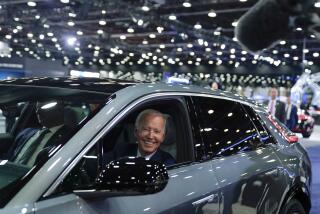2 Senate Democrats explore how to protect coal jobs and the environment
In June, Sen. Joe Manchin III of West Virginia, a defender of the coal industry, and Sen. Sheldon Whitehouse of Rhode Island, a champion of the environment, decided to set aside differences and learn about how climate change affects each other’s state.
Which is why one bright October morning, Manchin stood with Whitehouse on a trawler in Rhode Island Sound as fishermen and marine scientists explained how in 30 years, the fish have left where they are supposed to be, some species such as lobster have grown rarer, and the seas have turned more dangerous.
Friendly and relaxed, Manchin asked a few questions. But anyone expecting him to interpret the damage to Rhode Island as a mandate for federal action on climate change would be mistaken. He moved, instead, to defend coal.
“There is no doubt that 7 billion people have impacted our world’s climate,” Manchin said, relying on a narrative he has used in Washington as well as that day in Rhode Island. “We have a responsibility. But no one is going to stop using fossil [fuels] for a long time.”
In today’s Congress, historically unproductive and stocked with recipients of donations from fossil fuel industries, this cultural exchange between two East Coast Democrats counts as progress on climate change. It came about in part so Manchin could simply tell other senators wary of federal intervention that climate change is real.
“I didn’t invite Sen. Manchin here expecting him to have an epiphany and become a greenie and go to the next climate march,” Whitehouse said. “He has very, very good relations with some of the most conservative members of the Senate who think climate change is a conspiracy.”
If Manchin said that the damage from climate change wasn’t imaginary, Whitehouse said, “some of them might listen to him.”
While success on Capitol Hill is measured in such small doses, countries including the U.S. are pushing to forge an international emissions agreement by late 2015 to slow climate change and avert its worst effects. There are more heat-trapping gases in the atmosphere than ever in recorded history.
So far, the Obama administration has aggressively used existing authority to address climate change, such as the Environmental Protection Agency’s move to increase vehicle gas mileage and cut power plant emissions. But many economists and climate experts contend bolder steps, such as a carbon tax, are needed to make the deepest emissions cuts, and they require congressional action.
“The president and his team, we’re squeezing everything we can out of that authority,” said Todd Stern, the administration’s chief climate negotiator, during a speech at Yale University last week. “But you can’t go far enough unless you get new legislative action, and Congress is gridlocked on these things right now.”
Manchin gained notoriety during the 2010 midterm election with an ad in which he shot down the Democrats’ cap-and-trade bill because it was “bad for West Virginia.” Although Manchin does not deny the existence of man-made climate change, he is reluctant to curtail it, West Virginia political analysts say.
“You are talking about Kentucky, West Virginia, and people mining coal for two, three, four generations, and nothing else is there and people don’t see that anything else is possible,” said Jeremy Richardson, senior energy analyst with the Union of Concerned Scientists, whose own family has mined coal in West Virginia for three generations. “Coal mining is very much an identity, and successful action on climate change means we have to create new opportunities in the coal fields.”
Whitehouse’s trip to West Virginia on Wednesday will focus on how miners have been affected by the shrinking demand for Appalachian coal, driven mostly by mechanization, and more recently, by cheap natural gas and environmental rules. A bipartisan bill has been introduced in the House to protect miners from the economic effects of lower coal use, and Whitehouse’s staff is exploring the issue too.
Manchin himself made millions as a coal broker before entering politics, and his investments are now held in a blind trust. But at a seaside bar that has lost much of its beachfront to erosion and sea level rise, Manchin said, “I’m trying to learn so I can say I’ve been on the front lines” of climate change.
The Ocean State is losing ground to the Atlantic. The senators stopped by a tide gauge in Newport that has measured sea level since 1930. The tide rose 1 inch per decade until about 25 years ago, when the rate increased to 1.4 inches a decade. Along the coast, high tide increasingly leads to floods in parking lots, docks and other infrastructure. The state has lost about 150 to 250 feet of shoreline in the last 65 years.
Communities such as the blue-collar village of Roy Carpenter’s Beach have picked up their cottages and moved inland, after storms dragged roads, homes and parking lots into the sea.
“I just want them to understand how important this place is to us,” said Christa Thoresen, as Manchin and Whitehouse toured the cottages still on the shore’s edge, “and how much we have to lose to climate change.”
For Manchin, the coal industry advocate, the highlight of the trip appeared to be BioProcess Algae. The Portsmouth company operates a project in Iowa that takes heat-trapping carbon dioxide from an ethanol plant and uses it to grow algae, which is then used as animal feed. Whitehouse plans to talk to the EPA about including such options in its power plant greenhouse gas rules.
By using carbon dioxide as an algae feedstock, the technology would be a way to keep coal plants alive. An enthusiastic Manchin invited the company’s leaders to West Virginia to meet with power plant operators. Bounding to his car to head to the next stop, Manchin glanced back at the BioProcess building and said with a wide smile, “This is what it’s all about.”
More to Read
Start your day right
Sign up for Essential California for news, features and recommendations from the L.A. Times and beyond in your inbox six days a week.
You may occasionally receive promotional content from the Los Angeles Times.







